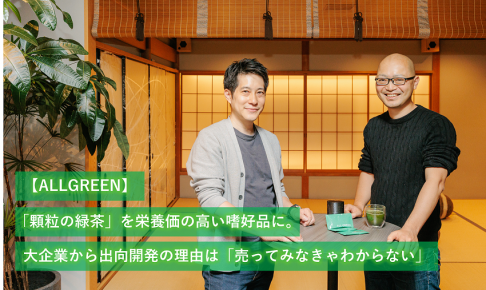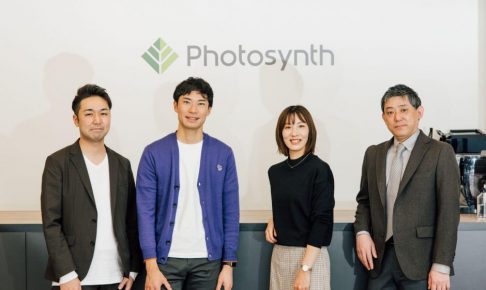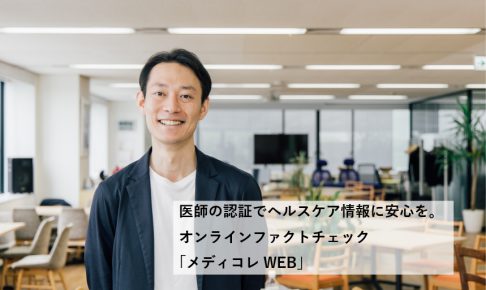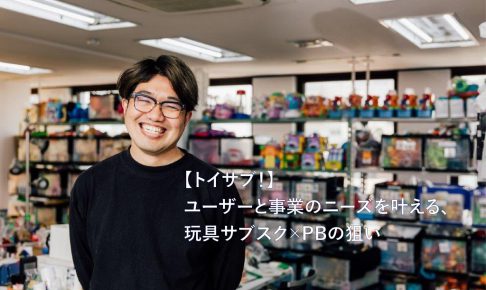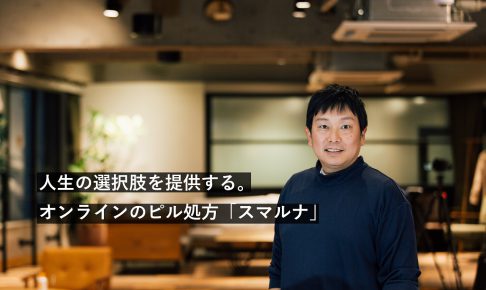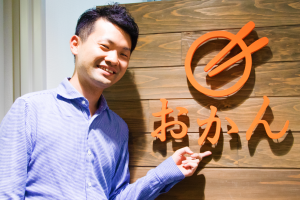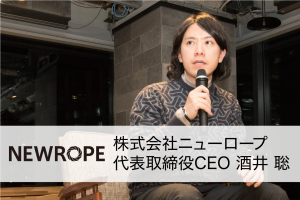FemTech, coupled with feminism, has been in full use in recent years. The number of services is increasing little by little in Japan. In the femTech field, Nekono operates a platform called "Sumarna" that allows you to prescribe pills online and provide gynecologicalmedical consultations.In 2020, the company also launched MediConnect, a personal authentication system for secure viewing of medical information. In the same year, femTech announced a globally large-scale funding of about 2 billion yen.
In this article, we spoke with Mr. Ishii, representative of Nekino, about the services of Sumarna and MediConnect, and about political activities to popularize FemTech.

President and Representative Director, Nexino Co., Ltd.
Kenichi Ishii
Born in Saitama Prefecture in 1978. Graduated from Teikyo University's Faculty of Pharmaceutical Sciences in 2001. Graduated from Kwansei Gakuin University Professional Graduate School in 2013. Pharmacist, MBA. Based on his experience in the Specialty Division of a foreign pharmaceutical company, he established Next Innovation Co., Ltd. (currently Nexino Co., Ltd.) in 2016, convinced of the possibility of creating online consultations. By the way, the company name was from fuji TV drama "Richman Pua Woman". Twitter: @kenichi141
Improve access to gynecology online
"Smarna" is an online consultation platform specializing in the gynecological field. The Sumarna Medical Consultation Office operates a medical consultation room where women suffering from menstruation and contraception can have their doctor prescribe the pill (also known as oral contraceptives or OC (Oral Contraceptics) for online consultations, and midwives and pharmacists can consult with women about their sexual and physical problems. In particular, regarding the prescription of the pill, it is said that the doctor must prescribe it under the current Japanese rules, but in most cases, the medical institution must go to the medical institution for medical examinations, and the burden is large for women. That's why it's a service that is expected in the sense of improving access to the pill.
In Sumarna, you can see us via text chat or video call. Consultation by text is available 24 hours a day, but doctors are generally available during the day. However, some doctors respond at night or on weekends, and make video calls, so users can expect replies outside of weekday daytime. Mr. Ishii says that Since Sumarna is operating during consecutive holidays and new year holidays, "it also functions as a social infrastructure." The use of Smarna itself is free and expensive when you buy a pill. Sumarna's business model is pharmaceutical wholesale, and it purchases medicines from pharmaceutical manufacturers and sells them to medical institutions. The difference is the profit.

(image: Nekino)
Sumarna comes online with pill prescriptions and gynecological consultations, but hospitals and clinics have traditionally been responsible for this offline function. So where are the needs of users of Smarna? In this regard, Ishii says, "The hurdles to going to a medical institution are high." Many consumers are ashamed or ashamed to attend gynecology. Moreover, it seems that there is a thing that it is not understood whether I is an object related to the gynecology in the first place. For users with such worries, the value of "being able to consult easily online" is large, leading to an increase in the number of users of Sumarna.
Low pill utilization compared to Europe and Southeast Asia
In December 2020, Nexino announced a total of approximately 2 billion yen in funding. Sumarna is a so-called Femtec service. In this industry that has just started up, there are not many companies that raise more than 1 billion yen even if they look around the world. Of course, it is not enough if the funding amount is large, but it is still surprising that Japanese startups in the femtec field, which have a smaller funding amount overall than in europe and the United States, were evaluated so much.
From Next Innovation Co., Ltd. to Nekino Co., Ltd. Completed funding of approximately 2 billion yen for the next stage of medical DX - Company name, logo, website also Re ▷ design (Saiteigi) -
https://nextinnovation-inc.co.jp/news/250RSOYpVq2bkP58e72qFs
In general, one of the most important items for funding venture capital is the market size that startups are challenging. However, there are no direct statistics on the Japanese pill market, and it is difficult to say that the pill is widely used in Japan in the first place. So how does Smalna see the pill market? The hint is the "penetration rate" of the pill.
In itsarticle Contraceptic Use by Method 2019, the United Nations publishes data on what methods of contraception are used on a per-use approach to each country. Japan has a 2.9% pill utilization rate (note: the actual utilization rate is estimated to be even higher because of the "Any Method" in other options), but france is 33.1% in Europe and the United States, and Thailand is 19.6% in Southeast Asia. Southeast Asian countries have relatively high numbers, which is due to the fact that pills can be easily purchased at pharmacies with pharmacists and their prices are low. In Southeast Asia, you can get the pill for about 300 yen, but the amount of the pill in Japan is about 3,000 to 4,000 yen including the examination fee, depending on the situation. It's really 10 times the price. I feel like it's a high amount of money to use the pill casually.
Of course, japanese, French and Thais have the same body structure. However, in France, the use of the pill is 33%, but in Japan it is about 3%. Therefore, Nekono's idea is that it is not strange that the 10x pill will spread in the future. There is no need. It's absolutely just not surfacing. (Mr. Nekino Ishii, as follows)

By the way, the debate on SRHR (Sexual and Reproductive Health and Rights, Sexual and Reproductive Health and Rights) is now spreading worldwide. In this trend, Ishii says, "The idea of 'I'm the one who decides whether to have a child or not' has become the mainstream in the world." On the other hand, in Japan, the choice for the presence or absence of children was close to that of men who use condoms, so few women had the option of independent contraception. In that sense, in modern Japan, it can be said that the spread of the pill is expected even for women to make their own choices.
Companies, governments, and educational institutions. Understand the needs of any organization
Nekino, which operates Smarna as a BtoC business, used this as b2B for "Sumarna forBiz". As mentioned above, the need for the pill is increasing throughout society, but access is not good. It was Sumarna who improved it.
Similarly, there are potentially biological women's health issues within the enterprise, but there is no way to solve them. That's where Sumarna for Biz comes in (by the way, it is estimated that the labor loss due to present-a-showism (which is due to menstrual pain etc. (that you can't work satisfactoryly due to mental and physical disorders) is estimated to be 491.1 billion yen per year in a 2013 survey).
Sumarna for Biz uses the system of "Sumarna Medical Consultation Room" as a corporate welfare system. Female employees consult with midwives and pharmacists about problems such as "menstruation is too hard to wake up in the morning" and "PMS is hindering work" that cannot be consulted by superiors or human resources departments. Of course, it is important to solve problems as individuals, but what we should pay attention to here is the "data" collected by Nexino.

From the Web page of Sumarna for biz
In recent years, european and American companies have been increasingly adopting egg freezing and gynecological services as benefits. For example, Facebook and Apple support the cost of freezing eggs for female employees(see). In Japan, there seems to be a case where similar proposals are on 俎 in the context of health management and improvement of the workability of female employees, but it seems that there are many cases where it does not come to adoption because "I have never heard such needs from employees". However, Ishii points out that this is the source of the mistake.
"What kind of benefits do you want?" When I asked the employees, only the existing contents came out. In addition, if you try to take menstrual leave, you will be told to take a rest, and there is no way that opinions such as egg freezing or online consultation of gynecology will come out. I don't say "I'm really troubled by menstrual pain", because I don't think it will solve it. That's why the company can't grasp the fact that employees are suffering from menstruation and egg freezing.
That's where the data from Sumarna for Biz is spent. Nekino uses the information gathered here in a way that does not know personal information, and tells the company that "there are only so many people in the company who are troubled with such things." On top of that, Nekino will help as a partner if companies "want to tackle this issue through benefits." In other words, companies use Sumarna for Biz to make sure their true situation - that is, female employees are really in trouble.
As of the end of 2020, companies will be able to use Sumarna for Biz for free. If an employee consults and needs a pill, it will direct the user to Sumarna, so that is the cash point for Nekono.
The beneficiaries of taking the pill are individuals, so we are not charging for companies at the moment. In order to implement the environment in which the pill can be swallowed in society, it is important to have each person know about the pill. The trigger is media and advertising, and one of them is using Sumarna for Biz.
In addition, Nekono is deepening cooperation not only with companies but also with educational institutions and governments in order to promote social implementation of the pill-taking environment. In educational institutions, there are examples of allowing students to consult individually online in the gynecological field. It is a service like the Sumarna consultation room for schools, and it is an image like an online health room from the student's point of life.
https://nextinnovation-inc.co.jp/news/3flfyQZbkj08xwSBSXjaVW
For the government, "consultation in the field of gynecology in the event of a disaster" is provided. For example, in the coronal disaster that will continue from 2020, there is a risk of infection with the novel coronavirus if a pregnant woman go to the clinic. If corona occurs in obstetrics and gynecology, the clinic needs to be closed for a certain period of time. If the closure occurs in the situation where obstetrics and gynecology (doctor) is insufficient even just, it might lead to the medical collapse in the region.
Then迂 you go to the clinic in a long way, you can consult online. Using the Smarna mechanism, patients can consult with midwives and pharmacists in advance, reducing the risk for the medical side and, above all, freeing patients from the hassle of going to the clinic (even if they only have to go online). It is a system that benefits both patients and medical institutions.
Securely understand data from birth to now
In December 2020, Nekino announced a new service called MediConnect. MediConnect is a system that securely connects my number card and health insurance card online. It is a "key" application for obtaining personal information related to medical care, and from the point of seeing from medical institutions and individuals, it may be an image of "a system that can see electronic medical services anywhere".
https://nextinnovation-inc.co.jp/news/3ZsCoEISHeKN1F9po7Ldup
For effective medical practice, it is essential to grasp the patient's test history and medication information. Under the current system, the medicine handbook will be close, but this is not a perfect system. However, in recent years when cloud technology and electronic medical services have developed, in theory, if access to them, it will be possible to grasp patient information, and there is no doubt that it will lead to effective medical practices. Especially if online medical care such as Sumarna becomes popular, it will not be uncommon for people who were examined by doctors in Hokkaido yesterday to consult with pharmacists in Okinawa tomorrow. Therefore, the need to "be available online at any time of the patient's information" is expected to increase in the future.
However, personal information called medical information should not be easily seen by anyone other than the person in question. MediConnect appears there. MediConnect said, "It is a function to complement the system that can use my number card as a health insurance card (ed.: this point will be described later) and to promote the development of use... (omission)... It is assumed that various data will be connected and will be used as a passport in the medical field" (quotedfrom MediConnect HP). By using MediConnect, hospitals can grasp the patient's test history and medication status, preventing duplication of tests and medications, and allowing pharmacists to provide medication guidance while looking at medical information at pharmacies. Patients also have to report events at other medical institutions.
As of 2020, the details of MediConnect have not been revealed because a patent application is pending, but the basic mechanism is "obtaining A's medical records handled by each medical institution from each medical institution with Mr. A's permission". Since Mr. A has been in various medical institutions since his birth, medical records from the time he was born to the day are scattered all over the place. MediConnect uses a unique ID to obtain this, but my number is used as this ID.
Speaking of medical IDs, health insurance cards come to mind. However, since the ID of the health insurance card changes due to the change of family name due to marriage and the change of job, it is a unique ID, but it is inconsistent. However, from March 2021, my number card will be able to be used as a health insurance card.My Number doesn't change for life, so you can use it as a unique ID. However, in addition, in the course of using my number as a health insurance card, it is essential to link the two with a system. However, in medical institutions, cooperation between the two has not progressed due to problems such as system introduction costs, burdens of explanations to patients, and security. MediConnect makes it easy and secure online for my number cards to work with health insurance cards.

From mediconnect web page
Medical institution B using MediConnect only uploads information to the electronic medical service. If the information in B is required when patient A went to the medical institution C, C obtains information from A via MediConnect with the permission of patient A (B does not need to be contracted with MediConnect, only C may contract).
As the first step of mediconnect collaboration, the collaboration between Sumarna and MediConnect has begun. This gives Sumarna users secure access to medical information at any time.
Sumarna was originally implemented in the service with the concept of MediConnect. If you allow the person in question to communicate in the Sumarna consultation room, medical institutions can be seen. That's what MediConnect does. But it's impossible to connect Sumarna to other platforms, so I'm trying to connect via MediConnect.
The debate over where and how to store personal information is on the way, but there is still no debate about how to use it. Nexino's stance is to provide a platform for addressing medical issues and un visibility needs.
Obiing is also necessary to spread FemTech
Nekino expands its playing field in FemTech and, consequently, the medical field, centered on Sumarna and MediConnect. Ishii says that future developments will be "pursuing SRHR services such as Smarna, and the other is the realization of medical DX."
Medical care in Japan is high quality, and there are many clinics in the city. This is my theory, but in the sense of improving the quality of life of the people, what needs DX in Japanese medical care is not "medical examination", but access to medical examinations and prevention. Nekino wants to pursue that.

By the way, an organization called the Medical Femtec Consortium (hereinafter called "MFC") has been established in 2020. This corporation is "an organization established with the aim of making Femtec compatible with medical care based on scientific evidence so that various products and services related to Femtec can receive legitimate evaluation in the medical system and pharmaceutical affairs system, and through it, to spread various products and services related to Femtec to society" (excerpted from hp). Nekino is also involved in the establishment and operation of MFC in order to spread FemTech.
As mentioned earlier, in Japan, for example, the penetration rate of the pill is low, and femTech's recognition is low in the first place, so it is difficult to say that the market is still forming. Some aspects of the law are strict and that if laws and regulations created decades ago are applied, they are bound by rules that are not necessarily in accordance with the present day. FemTech players, including each other from overseas, could be "better to attack Southeast Asia than troublesome Japan." However, this situation is not favorable for Japan because it invites a situation where products and services that can be beneficial do not enter the country. However, free economic activities are not allowed without regulation in the areas where medical care is concerned. In other words, from The Medical's point of view, it is important to clarify the relationship with FemTech.
For this reason, Nekino is cooperating with the establishment of the MFC in order to deepen cooperation with medical academia from the standpoint of FemTech players. The MFC also participated as an observer in the Femtec Promotion Council, which waslaunched within the LDP in2020. In anticipation of femTech's future ideal form, it seems to be working on politics and lobbying activities.
There are still barriers for Japan to popularize FemTech's services. Moreover, the one which is old in the barrier, and does not fit the present day is not few. That's why it may be necessary to revise the rules. In addition to spreading its own services, Nexino is also active in spreading FemTech to Japan through lobbying activities. With regard to the spread of FemTech, including Sumarna and MediConnect, it is likely that attention should be paid not only to services but also to politics.
(text: Hayabei Nattomi, edit: pilot boat, photo: taisho)

